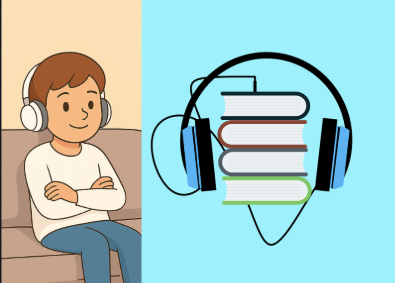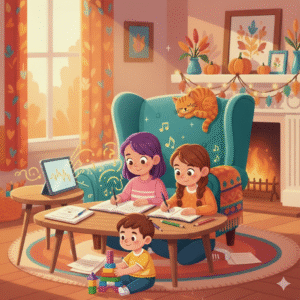
Listening Counts
Audiobooks Are Legit Learning (And a Beneficial Homeschool Resource)
If you’ve ever wondered whether audiobooks “really count” as reading, here’s the good news: they do, and there’s solid research to back it up. Studies show that listening to audiobooks activates many of the same parts of the brain as reading text, supporting vocabulary growth, comprehension, and critical thinking. For homeschooling, supplementing with audiobooks can make it possible to cover more ground, reach struggling or reluctant readers, and quite possibly keep the joy of stories alive in a busy household.
The Big Benefits of Listening
Audiobooks can be a handy addition to your homeschooling routine, helping your kids to:
Build Vocabulary and Language Skills: Kids are exposed to rich, complex language, correct pronunciation, and varied sentence structures, often beyond their independent reading level.
Improve Comprehension: With decoding out of the way, listeners focus on story and meaning.
Develop Background Knowledge: Hearing about historical eras, scientific concepts, and cultural settings expands their world knowledge.
Improve Reading Fluency: Kids get to hear the pacing, rhythm, and expression of good reading.
(As an Amazon Associate I earn from qualifying purchases).

Right now, get 30 days free, with full access to thousands of included titles, originals, and podcasts. Cancel online anytime. (View Deal on Amazon.)

Audiobooks + Activities = Active Listening
While listening to audiobooks, kids can keep their hands busy and brains on with activities like building with Legos, sketching, and crafting. After listening, kids can do story retelling, sketch characters and settings, do book reviews, or have discussions or debates about character choices and themes.
The Audiobook Solution
Most homeschoolers are juggling multiple ages, subjects, comprehension, and attention levels, making it very difficult to do all the reading aloud. Here’s where audiobooks shine:
They give you a breather. While one kid is listening to The Chronicles of Narnia, you can be making lunch or helping your other kid with math.
They foster a positive association with reading. Kids who struggle to decode words can still enjoy great stories, like The Adventure Collection (featuring White Fang, The Call of the Wild, and others).
They make the classics and harder-to-read texts more approachable. Pairing an audiobook with a print version of a classic (like Treasure Island or Robinson Crusoe), can make a huge difference, especially when the language is challenging. Listening while following along in the book can help a reader get the gist of older writing styles and difficult vocabulary without watering down the story.
They facilitate multi-age learning. Your 12-year-old and 8-year-old can both follow along with The Story of the World, even if only one of them could read it independently.
They Enrich Unit Studies. Audiobooks like the Who Was series add storytelling elements to history and science topics you’re studying.
Audiobooks serve as excellent complements to traditional reading and provide valuable support during those busy times. Not to mention they’re great for car rides and longer road trips, which is when we especially enjoyed getting into The 39 Clues and The Mysterious Benedict Society.
Audible is an easy way to build a high-quality listening library with titles that you own, even if you cancel your subscription. They have a huge selection with a variety of top-notch narrators to choose from. Over time, you can amass a permanent collection of stories and learning titles you can revisit anytime. View their special offer on Amazon.
